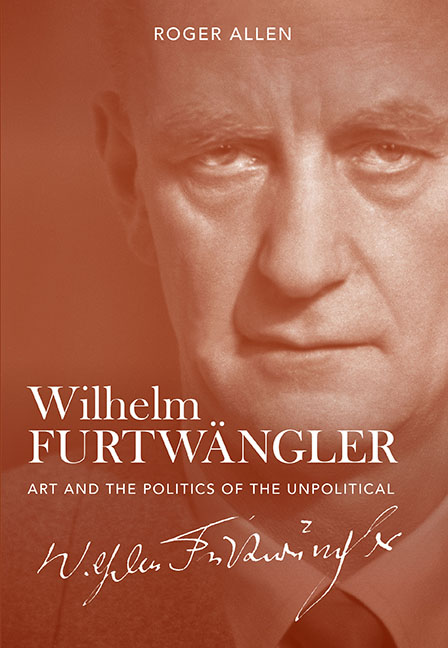Book contents
- Frontmatter
- Dedication
- Contents
- List of Illustrations
- List of Abbreviations
- Prelude
- Acknowledgements
- Preface
- Note on Translations
- Chronology
- Introduction
- 1 Wilhelm Furtwängler: The Historical, Cultural and Intellectual Background
- 2 Childhood and Youth (1886–1911)
- 3 Lübeck and Mannheim (1911–20)
- 4 Furtwängler in the Weimar Republic (1919–33)
- 5 Furtwängler and the Nazi State I (1933–35)
- 6 Furtwängler and the Nazi State II (1935–45)
- 7 Reflection and Reaction: Furtwängler in the Immediate Post-War Period (1945–50)
- 8 Furtwängler as Symphonist
- 9 ‘All Greatness is Simplicity’ (1951–54)
- 10 Afterword
- Appendix 1 Two Furtwängler Essays
- Appendix 2 Thomas Mann, ‘Germany and the Germans’ (1945)
- Appendix 3 Audio and Visual Sources
- Bibliography
- Index
3 - Lübeck and Mannheim (1911–20)
Published online by Cambridge University Press: 17 July 2019
- Frontmatter
- Dedication
- Contents
- List of Illustrations
- List of Abbreviations
- Prelude
- Acknowledgements
- Preface
- Note on Translations
- Chronology
- Introduction
- 1 Wilhelm Furtwängler: The Historical, Cultural and Intellectual Background
- 2 Childhood and Youth (1886–1911)
- 3 Lübeck and Mannheim (1911–20)
- 4 Furtwängler in the Weimar Republic (1919–33)
- 5 Furtwängler and the Nazi State I (1933–35)
- 6 Furtwängler and the Nazi State II (1935–45)
- 7 Reflection and Reaction: Furtwängler in the Immediate Post-War Period (1945–50)
- 8 Furtwängler as Symphonist
- 9 ‘All Greatness is Simplicity’ (1951–54)
- 10 Afterword
- Appendix 1 Two Furtwängler Essays
- Appendix 2 Thomas Mann, ‘Germany and the Germans’ (1945)
- Appendix 3 Audio and Visual Sources
- Bibliography
- Index
Summary
What I saw growing out of the burgherly character was not the hard bourgeois, but the artist.
Furtwängler's rise to musical pre-eminence in Germany was rapid. It took a mere thirteen years for him to progress from the journeyman position of third assistant conductor to Hans Pfitzner at the Strasbourg Opera from 1909 to 1911 to that of one of the leading musical directors in Germany when in 1922 he assumed the late Arthur Nikisch's mantle as head of the Leipzig Gewandhaus and Berlin Philharmonic orchestras. Yet this rise took place against a background of turbulent political upheaval during which Germany experienced the end of the Wilhelmine Reich, the carnage of World War I, the shock defeat of 1918 and the faltering attempts at democracy under the nascent Weimar Republic.
Furtwängler's first substantive appointment was as chief conductor in the ancient Hanseatic town of Lubeck from 1911 to 1915, where the nature of his work was largely determined by the cultural tastes and values of the patrician families of the Bürgertum whose social ethic and customs provided Thomas Mann (1875–1955) with such rich material for his 1901 novel Buddenbrooks. In a retrospective look back at the Lubeck of his youth Mann later wrote
I think back to the corner of Germany […] which formed the first framework of my existence: it was the old Lubeck, near the Baltic, once the Bailiwick of the Hansa, founded before the middle of the twelfth and elevated by Barbarossa in the thirteenth century to be a free imperial city. The extraordinarily beautiful Town Hall, which my father frequented as a Senator, was completed in the year in which Martin Luther nailed his theses to the gate of the castle church in Wittenberg; i.e., at the onset of the modern era. Just as Luther, the reformer, was in his manner of thinking and in his soul a man of the Middle Ages and wrestled with the Devil all his life, in the same way one could stroll in the Protestant Lubeck that had become a republican member of Bismarck's Reich, and still move in the atmosphere of the gothic Middle Ages.
- Type
- Chapter
- Information
- Wilhelm FurtwänglerArt and the Politics of the Unpolitical, pp. 54 - 86Publisher: Boydell & BrewerPrint publication year: 2018

